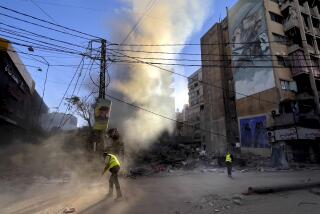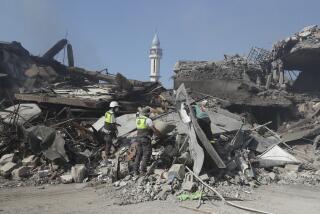Syria Alarmed by Israeli Rhetoric : Damascus Has Air Units on Alert Against Possible Attack
DAMASCUS, Syria — The Syrian government is becoming increasingly alarmed about the possibility that Israel is planning to launch a military strike soon, according to Western diplomats and Syrian officials.
Israel and Syria have been engaged for several months in an increasingly bellicose war of words over rival military moves in Lebanon. But fears of an Israeli raid have escalated sharply after the Israeli government charged that Syria was involved in a terrorist attempt on April 17 to place a bomb on board an El Al Israel Airlines jumbo jet in London.
“Linking Syria to terrorist operations in Europe coincides with joint American-Israeli threats in preparation for an attack on Syria,” the government newspaper Tishrin commented.
Although the fiery talk of war has subsided somewhat in the past few days, Syrian air force units remain on maximum alert in expectation of an Israeli attack, according to Western diplomats.
‘Cannot Ignore Threats’
“You cannot trust the Israelis’ soft language,” a close adviser to President Hafez Assad said, “and you cannot ignore their threats. We conclude that we must be all the time vigilant.”
A central concern in Syrian government circles appears to be that Israel has long sought a justification for an attack against Syria that would stop short of all-out war but would eliminate the recent Syrian military buildup.
Syrian officials fear that the bomb intended for the El Al plane may be regarded as such a justification, although Syria has denied vehemently that it was connected in any way with the operation.
But since the London incident came on the heels of the April 15 American air raid on Libya, Syrian officials said, they are worried that Israel may feel emboldened by the anti-terrorist atmosphere prevailing in the West right now, even though they believe that Israel’s motives are essentially military.
“If Syria really was connected with the El Al bomb, they have created the best climate for Israel to take action since 1982,” one Western diplomat said, referring to the Israeli invasion of Lebanon in June of that year. Israel said the 1982 invasion was intended to move the Palestine Liberation Organization away from its northern border. The final straw was the attempted assassination of Shlomo Argov, the Israeli ambassador to London.
According to Western military analysts here, Assad has pursued a clever strategy of “incremental” military moves, none of which taken singly would appear to justify Israeli retaliation.
The Syrian moves, which Israeli officials have dubbed “the creep” because of their gradual nature, include the intermittent deployment of mobile surface-to-air missiles in eastern Lebanon’s Bekaa Valley after the downing of two Syrian jet fighters by Israeli warplanes in November.
The Israelis were also annoyed by the Syrian installation of high-altitude anti-aircraft missiles just inside Syria’s border with Lebanon, a move that forced Israel to shift its air reconnaissance flights over Lebanon about 10 miles westward, away from the border.
Last week, Israel complained about Syria’s construction of earthen fortifications for tanks in the lower Bekaa Valley. According to Western diplomats here, the tank emplacements, which are still empty, are spread between Lake Qaraaoun in the west and Rachaiya in the east. The location is south of Syria’s current position and thus closer to Israel, but substantially north of the line marking the Syrian forces’ southernmost deployment between 1976 and 1982.
Syria denies having any aggressive intentions toward Israel, and its position is generally accepted by neutral and Western military observers in Damascus.
“The Israelis are worried that the Syrians have miscalculated their deterrent,” one Western diplomat said. “There is a tremendous temptation to remind them who is in charge.”
Many analysts here believe that Syria’s military moves can be seen as defensive actions in response to Israeli initiatives in Lebanon.
“Syrians are not in any way in an aggressive posture toward Israel,” a military expert said. “Israelis are trying to build a history of Syrian aggressiveness, but the fact is that Israel would kick in Syria’s teeth in 30 minutes, and everybody from Assad on down knows it. These are pragmatic people.”
A scenario popular among Syrian officials suggests that the Israelis might launch massive air strikes against Palestinian bases in Lebanon as an anti-terrorist measure and at the same time attack Syrian missile bases in Syria.
In addition to the anti-aircraft missiles, Syria has deployed ground-to-ground missiles targeted on key Israeli areas, and this has the Israeli military alarmed.
The missile sites, along with Syrian harbors in the north, are considered likely targets because destroying them would set back by several years Assad’s goal of strategic parity with Israel.
The diplomats dismissed as nonsense suggestions from Israeli officials that Syria may be tempted to attack now because its military hardware is growing obsolete and the country’s current economic difficulty makes purchasing new equipment difficult.
Sense of Unease
There is a sense of unease here after the American raid on Libya because of the poor performance of Libya’s Soviet-supplied air defense systems. Syria uses the same systems, while Israel has the latest in American electronic warfare equipment and tactical jet fighters.
“The Syrians were rather shocked,” one diplomat said. “It left them wondering whether Libya’s poor showing was due to lack of training and discipline or some intrinsic weakness in their missile defense. If it’s the latter, the Syrians know they are in deep trouble.”
One Syrian response to the crisis has been to move quickly to deny that it supports terrorism.
Syrian officials say that they are working to help free American and French hostages in Lebanon. Their efforts include a trip to Iran on Monday by Foreign Minister Farouk Shareh and clashes between Syrian forces in the Bekaa Valley and the Islamic fundamentalists who are believed to be holding the hostages.
Syria apparently believes that freeing the hostages will repair its image and is telling foreign diplomats here that the government will cooperate in the international effort to contain terrorism.
More to Read
Sign up for Essential California
The most important California stories and recommendations in your inbox every morning.
You may occasionally receive promotional content from the Los Angeles Times.










